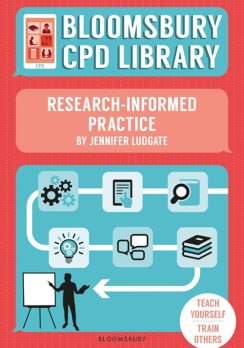Publisher
Bloomsbury
ISBN 10
1472961536
Published
19 Sep 2019
Maria Cunningham is impressed by a book that’s sensitive to the principles of good CPD and thoughtful implementation
When talking to colleagues in schools about their use of research and applying evidence to the classroom, the teachers I meet tend to fall into two camps. Either their eyes light up and they enthusiastically reel through who they follow on Twitter, when they last attended ResearchEd and the entire contents of their CPD library; or, more frequently, they dismiss it entirely as something with which they might engage if only they had the time/resources/support from leadership.
So I admit to being a little sceptical about books aimed at practitioners that tackle this area. How do we avoid simply preaching to the converted? And how do we use examples or case studies of best practice as a lever to support others on their journey, rather than a stick with which to beat them?
Jennifer Ludgate’s Research-Informed Practice claims to provide simple, manageable strategies for busy classroom teachers to access and engage with research, directly acknowledging that it can be complex and time-consuming to do it well. You can tell that Ludgate is a teacher, herself accustomed to thinking about this within the limits of a jam-packed school timetable. Both the advice and resources provided throughout the book reflect this. A research-informed practice self-assessment questionnaire, for instance, gives the reader autonomy to select either a quick approach, a more considered one or a combination of the two. I was pleased at the author’s insistence that “quick” does not equate to corner-cutting. Expectation is managed incredibly well from the outset – change “cannot happen overnight”.
The book is split into two parts: Train Yourself and Teach Others, with five main chapters sequenced as a walk-through of the change process. From initial reflection (Stage 1) to embedding research-informed practice (Stage 5) Ludgate’s commentary is enthusiastic and reassuring, while modelling fidelity to the principles of effective CPD.
Ludgate’s commentary is enthusiastic and reassuring
In listing her estimation of the key research every teacher should read, she offers some excellently accessible summaries of topics such as metacognition and Rosenshine’s principles of instruction. Each is structured clearly, with an overview, key ideas to take away, overall considerations and suggested further reading.
It is the takeaways that give Research-Informed Practice its edge. Teachers love CPD that involves practical strategies, resources or ideas that can slot straight into their professional repertoire, and this book is brimming with them, including an impressive 19 training plans to suit a variety of needs and timescales – invaluable reading for existing or aspiring school research leads. Though the book suggests application does not necessarily require staff to be in leadership positions, that does feel important in order to reach the suggested end-point of developing a whole-school research-informed culture.
There is sensitive, emphatic articulation of the importance of organisational culture and of getting this right before jumping straight into implementation. Ludgate rightly reminds us that CPD is too often planned without careful identification of what would look different in terms of student outcomes, attitudes of staff and wider teaching and learning. For anyone who has ever sat through (or perhaps guiltily been the perpetrator of) a generic whole-staff INSET, with fuzzy links to staff or pupil needs, I urge you to pay particular attention to part two of her book, for a wealth of wisdom on vision, colleague buy-in, audience and purpose.
I particularly enjoyed the Evaluation Of CPD chapter. Though tagged on to the end, it is by no means an afterthought, covering an array of approaches and measures to strengthen the evaluation of research-informed strategies. In fact, it feels powerful that one of the book’s parting messages is a caution against using “big data”, such as SATs or GCSE results, as a definitive answer to whether training has had the desired impact.
The author invites us to see research-informed practice as a cyclical journey of trialling, embedding and refining, made better by working with others and bringing them along with you. After reading this book, you will see very little reason not to join in.













Your thoughts